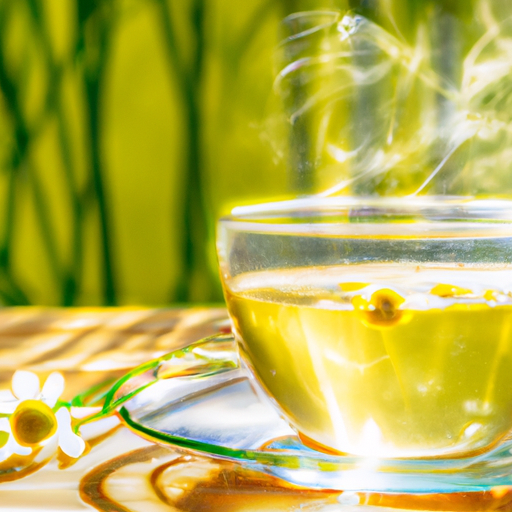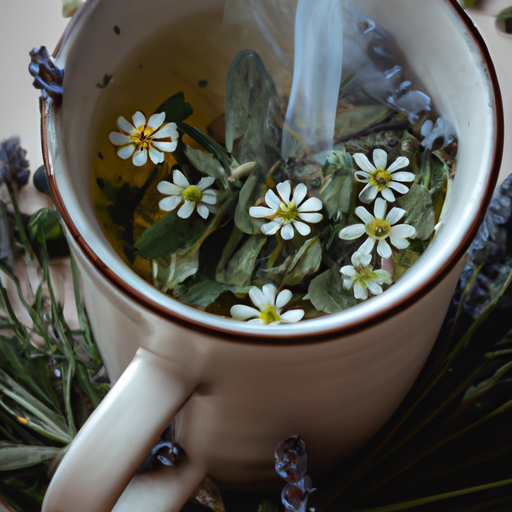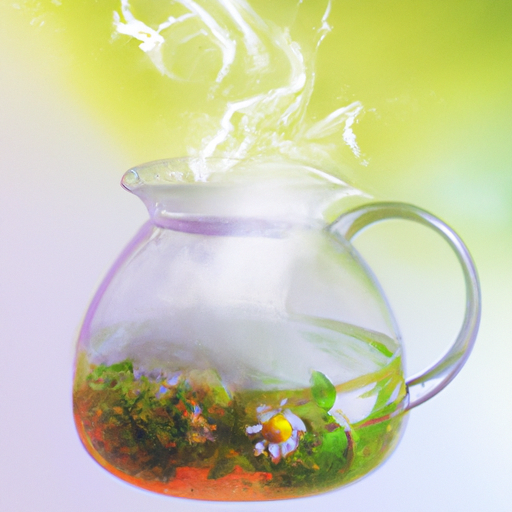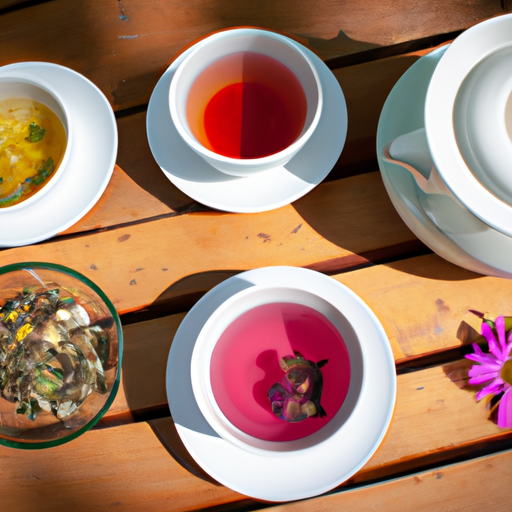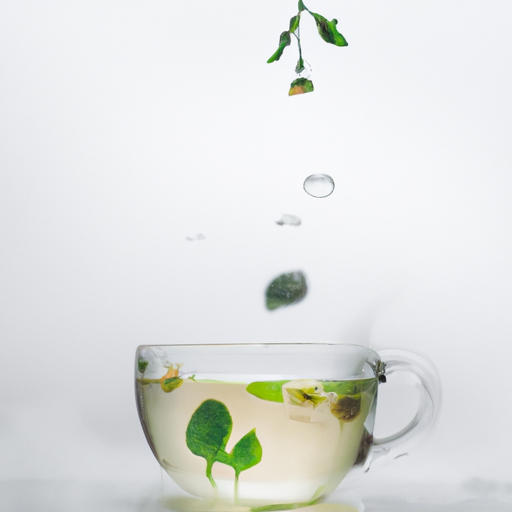I understand your skepticism – herbal tea for caffeine withdrawal? Can it truly be effective? Let me assure you, it definitely can!
When you’re trying to break free from the clutches of caffeine addiction, herbal teas can be a soothing and natural alternative to help ease those withdrawal symptoms.
Peppermint tea, with its refreshing taste and aroma, can provide a much-needed pick-me-up without the jitters.
Chamomile tea, on the other hand, promotes relaxation and calm, making it perfect for those moments when you’re feeling anxious or restless.
And ginger tea, with its soothing properties, can alleviate the headaches and irritability that often accompany caffeine withdrawal.
But it doesn’t stop there. Rooibos tea, lemon balm tea, passionflower tea, and valerian root tea all have their unique benefits in supporting you through this process.
From antioxidant properties to reducing anxiety and promoting better sleep, these herbal teas are a holistic and natural solution to help you on your caffeine detox journey.
So, if you’re ready to break free from caffeine’s grip, why not give herbal tea a try? It’s time to embrace the power of nature and find a healthier, caffeine-free way to live.
Key Takeaways
- Peppermint tea can help alleviate caffeine withdrawal symptoms such as headaches and fatigue.
- Chamomile tea can promote relaxation and calmness during caffeine withdrawal.
- Ginger tea is beneficial for reducing headaches, relieving nausea, boosting energy, and supporting digestion during caffeine withdrawal.
- Rooibos tea serves as a caffeine-free alternative with antioxidant benefits and can promote relaxation during caffeine withdrawal.
Peppermint Tea: A Refreshing Option for Caffeine Withdrawal
Peppermint tea is a fantastic option for caffeine withdrawal because it provides a refreshing and soothing alternative. The benefits of peppermint tea go beyond just its delicious taste. It has been known to alleviate symptoms of caffeine withdrawal, such as headaches and fatigue.
The cool and invigorating flavor of peppermint can help ease the transition from caffeine to a caffeine-free lifestyle. To make peppermint tea at home, simply steep a handful of fresh peppermint leaves in boiling water for about 5-10 minutes. You can also add a touch of honey or lemon for extra flavor.
Sipping on this herbal tea throughout the day can help curb cravings and provide a natural energy boost. Peppermint tea is not only a great choice for caffeine withdrawal, but it also offers numerous health benefits. It aids digestion, relieves stress, and promotes relaxation.
So, next time you find yourself craving caffeine, reach for a cup of refreshing peppermint tea instead.
Chamomile Tea: Promoting Relaxation and Calm during Caffeine Detox
While chamomile has been known for its calming effects, I can attest that it’s strong enough to combat the symptoms of caffeine withdrawal. Chamomile tea is a soothing remedy that promotes relaxation and helps ease the transition during a caffeine detox. Its natural properties have been used for centuries to calm the mind and body, making it an excellent choice for those seeking a gentle alternative to caffeine.
The soothing aroma and delicate flavor of chamomile tea create a tranquil experience, allowing you to unwind and find peace amidst the challenges of withdrawal. Sipping on a warm cup of chamomile tea not only provides a moment of serenity but also supports your body’s natural healing process, making it an ideal herbal tea for caffeine withdrawal.
Ginger Tea: A Soothing Remedy for Caffeine Withdrawal Symptoms
Experience the soothing benefits of ginger tea as it helps alleviate the symptoms of caffeine withdrawal. Ginger tea is a natural remedy that promotes healing, providing relief during this challenging time.
Here are some benefits of ginger tea for caffeine withdrawal:
-
Reduces headaches: Ginger tea has anti-inflammatory properties that can help ease the pain associated with caffeine withdrawal headaches.
-
Relieves nausea: Ginger has long been used to alleviate nausea and stomach discomfort. Drinking ginger tea can help calm your stomach and reduce feelings of queasiness.
-
Boosts energy: While ginger tea is caffeine-free, it can still provide a gentle energy boost, helping to combat the fatigue often experienced during caffeine detox.
-
Supports digestion: Ginger tea aids digestion and can help soothe any gastrointestinal issues that may arise during the withdrawal process.
Try this simple ginger tea recipe: steep one tablespoon of freshly grated ginger in hot water for 10 minutes. Add a squeeze of lemon and a teaspoon of honey for added flavor. Sip and enjoy the healing benefits of ginger tea during your caffeine detox.
Rooibos Tea: A Caffeine-Free Alternative with Antioxidant Benefits
Indulge in the rich and flavorful Rooibos tea, a caffeine-free alternative that offers a multitude of antioxidant benefits to support your journey towards a caffeine-free lifestyle.
Rooibos tea is a wonderful herbal remedy for caffeine withdrawal, as it provides a natural and holistic approach to overcoming the symptoms. Not only does Rooibos tea help to alleviate headaches and fatigue commonly associated with caffeine withdrawal, but it also promotes relaxation and calmness.
The antioxidant properties of Rooibos tea can help to boost your immune system and protect your body from free radicals.
Additionally, the taste of Rooibos tea is earthy and slightly sweet, making it a delightful and satisfying beverage to enjoy throughout the day.
Incorporating Rooibos tea into your caffeine-free routine can be a soothing and beneficial choice for your overall well-being.
Lemon Balm Tea: Easing Anxiety and Promoting Better Sleep during Caffeine Withdrawal
Lemon Balm tea is a fantastic remedy for easing anxiety and promoting better sleep, making it a must-have during your caffeine-free journey. This herbal tea not only helps with caffeine withdrawal, but it also improves cognitive function and reduces irritability.
Lemon balm tea contains compounds that have been shown to have calming effects on the mind and body. It can relieve muscle tension and promote relaxation, allowing you to unwind and get a good night’s sleep. The natural properties of lemon balm tea work in harmony with your body, providing a holistic approach to caffeine detox.
By incorporating this herbal tea into your routine, you can experience the soothing benefits it offers, helping you navigate through the challenges of caffeine withdrawal with ease.
Passionflower Tea: Supporting Mood and Reducing Headaches during Caffeine Detox
Try incorporating passionflower tea into your routine to support your mood and reduce headaches while detoxing from caffeine. Passionflower has been used for centuries as a natural remedy for various ailments, and its mood-boosting effects make it a perfect choice during caffeine withdrawal.
Here are three reasons why passionflower tea can be beneficial for you:
-
Calming properties: Passionflower contains compounds that have a calming effect on the nervous system, helping to reduce anxiety and promote a sense of relaxation.
-
Headache relief: Caffeine withdrawal can often lead to headaches, but passionflower tea can help alleviate this symptom. It has been shown to have analgesic properties, providing relief from headaches and migraines.
-
Better sleep: During caffeine detox, sleep disturbances are common. Passionflower tea can help improve sleep quality by promoting deeper and more restful sleep, allowing your body to recover and rejuvenate.
Incorporating passionflower tea into your routine can be a natural and holistic way to support your mood and alleviate headaches during caffeine withdrawal.
Valerian Root Tea: Enhancing Sleep Quality and Reducing Restlessness during Caffeine Withdrawal
Unwind after a long day with a warm cup of valerian root tea, allowing its soothing properties to transport you to a state of deep relaxation and tranquility. This herbal tea enhances your sleep quality as you navigate your journey to a caffeine-free lifestyle. Valerian root tea is a natural remedy that can help reduce restlessness and promote a restful night’s sleep during caffeine withdrawal. Known for its sedative effects, valerian root has been used for centuries to calm the mind and relax the body. By incorporating this herbal tea into your evening routine, you can experience a sense of calmness and peace. Say goodbye to tossing and turning and embrace the restorative powers of valerian root tea as you embrace a caffeine-free lifestyle.
Frequently Asked Questions
Can herbal teas completely replace the need for caffeine during withdrawal?
During caffeine withdrawal, herbal teas can be an effective alternative method for reducing the need for caffeine. They provide natural remedies to help alleviate withdrawal symptoms and promote a holistic approach to wellness.
Are there any side effects associated with drinking herbal teas for caffeine withdrawal?
There are potential risks and interactions with medications when using herbal teas for caffeine withdrawal. It’s important to consult with a healthcare professional before incorporating them into your routine.
How long does it take for herbal teas to alleviate caffeine withdrawal symptoms?
Herbal teas can help alleviate caffeine withdrawal symptoms. The duration of symptoms varies based on factors like individual tolerance and tea effectiveness. Different herbal teas can be compared for their efficacy in easing withdrawal.
Can I combine different types of herbal teas for better results during caffeine detox?
I find that combining different types of herbal teas can enhance relaxation during caffeine detox. It’s worth exploring the effectiveness of specific herbal teas for managing caffeine withdrawal symptoms and finding the right combination for your needs.
Are there any recommended dosages for drinking herbal teas for caffeine withdrawal?
Recommended herbal tea dosages vary depending on the individual’s tolerance and the severity of caffeine cravings. Herbal teas like chamomile, peppermint, and ginger can be beneficial for reducing caffeine cravings.
Conclusion
In conclusion, incorporating herbal teas into your caffeine withdrawal journey can provide holistic and natural support for your body and mind. These teas, such as peppermint, chamomile, ginger, rooibos, lemon balm, passionflower, and valerian root, offer various benefits including relaxation, soothing symptoms, antioxidant support, anxiety relief, mood enhancement, and improved sleep quality.
Did you know that, according to a study published in the Journal of Ethnopharmacology, passionflower tea has been found to significantly reduce caffeine withdrawal symptoms? Embracing the power of herbal teas can truly enhance your caffeine detox experience.

